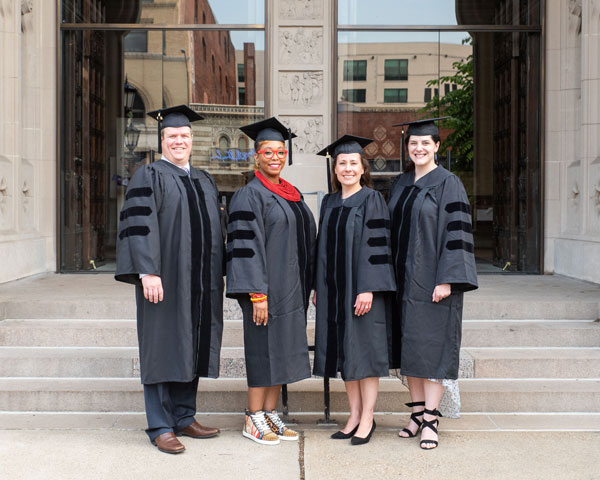People often wonder what makes a Doctor of Ministry different from a PhD. Perhaps they’re considering pursuing a DMin or PhD and want to make sure they have all the facts straight. Here are some of the primary differences, with a special emphasis on the PTS Doctor of Ministry program.
Two Hallmarks of a DMin Degree
Practices and context. Those are the two touchstones of the Doctor of Ministry degree. Both PhD and DMin degrees involve research and writing. They also both seek to deepen knowledge. The DMin cultivates a particular kind of knowledge though: knowledge formed in specific places through particular practices. PhD students have to narrow their research questions too, but they can choose to investigate universal and abstract knowledge. By contrast, DMin questions must be tied to particular practices in specific ministry settings where the students live and work and have their being. The DMin degree is after “emplaced” knowledge tied to specific practices. The knowledge gained in that setting can be applied more broadly, but the questions need to emanate from particular questions developed in a specific context.
There are other differences as well. A DMin is considered a professional degree. It is conferred upon people who are actively engaged in ministry. A PhD degree is generally oriented toward academia. PhDs generally take longer to finish and require lengthier course work, foreign languages, and comprehensive exams. Most people who pursue PhDs in religion hope to teach in an academic setting. People who pursue DMin degrees may teach within their ministry setting, but the possible ministry settings are vast and varied.
PTS DMin: Cohort Learning
At Pittsburgh Theological Seminary, we believe that the questions of practice and context are best explored in community. It is no accident that an intentional cohort model lies at the heart of the DMin program at PTS. The professors who teach in our DMin program bring great depth and richness, but the most important learning happens between the students in the cohort. Students journeying together grow their wisdom not only through reflection on their own practices and context, but through the insights and challenges posed by the ministry questions from their colleagues’ contexts. Seeing the world through others’ lives requires us to stretch and grow. Deepened understanding and empathy are rich gifts bequeathed by spending time with colleagues in an ongoing community of learning and support.
PhD work and DMin work each bring their own gifts and challenges. The DMin degree is a great choice for someone who wants to go deep while tending to place and practice. We’d love for you to explore the DMin opportunities at Pittsburgh Theological Seminary.
The Rev. Dr. Denise Thorpe is the former interim director of the Doctor of Ministry program. A graduate of Duke University (Th.D. and J.D.), Yale University (M.Div.), and North Park University (B.A.), she is ordained as a minister of Word and Sacrament in the Presbyterian Church (USA). Thorpe is currently preparing her manuscript, “Memory on Fire: The Remembering of the Lithuanian Body Politic,” for publication and also serving as the pre-publication editor for a multi-author volume on physician well-being. An independent scholar, theologian, writer, pastor, and facilitator (and also trained as a lawyer and mediator), she is interested in how and where God is present in the complicated and “messy” spaces of life.

